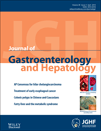Interferon treatment for patients with chronic hepatitis C complicated with chronic renal failure receiving hemodialysis
Abstract
Background and Aims
The Japan Society for Dialysis Therapy established “Guidelines for the Treatment of Hepatitis C Virus Infection in Dialysis Patients.” We evaluated the status of HCV infection and the treatment of hemodialysis patients in Gunma prefecture.
Methods
Questionnaires concerning the infection rate, recognition of the guidelines, and treatment status were sent to all 64 hospitals/clinics that had hemodialysis systems in Gunma prefecture. The hepatitis C virus-infected hemodialysis patients who received pegylated interferon (peg-IFN) were analyzed at Gunma University Hospital.
Results
The positive rate for hepatitis C virus antibody was 256/2582 hemodialysis patients (9.9%). The positive rate varied between institutions (range 0–40.0%; median 9.0%). All institutes recognized the establishment of the guidelines. Conventional or peg-IFN treatment was being given at 37.5% of the institutions. The other 62.5% institutions answered that they intended to provide the treatment in the future if collaboration with a hepatologist could be arranged. The most common answers regarding the indication for IFN treatment were as follows: few complications, under 60 years of age, more than 10 years of survival expected on hemodialysis. Eighteen patients received peg-IFN treatment. The sustained virological response rate of all patients was 33.3%, 0% in 1b/high viral titer, 50% in genotype 2, and 100% in genotype 2/low viral titer. The sustained virological response rate was worse in the patients with 1b/high viral load and diabetic nephropathy (P < 0.05).
Conclusions
Recognition of the publication of the guidelines was high. However, the number of patients treated with peg-IFN was still low. Further enlightenment and cooperation between hemodialysis teams and hepatologists are therefore needed.




